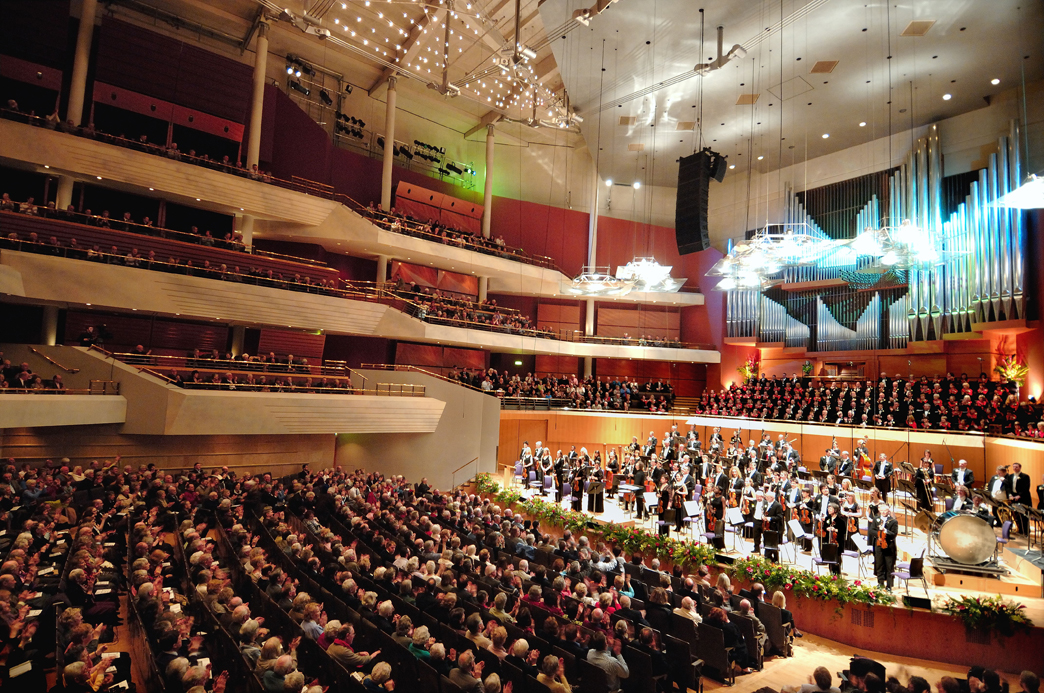Part of every season, The Halle Orchestra perform a series of POPS concerts which are themed concerts of lighter classical pieces, and therefore aimed at a broader spectrum of potential audience, and hopefully making classical music and the Bridgewater Hall more accessible to a wider public.
Last night's theme was Spain, and this proved to be a very popular choice judging by a very healthy audience with an unusually young bias. For once I was not the youngest audience member, and this was heartening.
The concert was once again conducted by Stephen Bell, and so you can be certain you are in very safe hands musically, and it felt almost as if I were greeting an old friend when he walked onto the stage. I have seen him several times over the last few months, and the familiarity of knowing the conductor and being absolutely certain that the orchestra will be 100% secure under his baton, was a nice feeling.
The first piece was music which felt much more like ballet music than a piece of concert music; Capriccio Brilliante On The Jota Aragonesa, otherwise known as The Spanish Overture, by Russian composer Mikhail Glinka.
Glinka spent the last few years of his life in Spain, and this was the only piece of music he completed whilst there; however there is still a distinct Russian feel to the music, especially in the opening introduction of strident notes and blasts of brass before the music settles into the theme, complete with castanets.
As custom demands, the first piece of music is always played unintroduced, and then, the conductor metamorphoses into MC to introduce and explain a little about each of the pieces. I always enjoy this, for two reasons. First, despite most of what he says being in the programme, it is always nice to hear it too and be reminded of what you have just read; and second, it is a much more friendly and accessible concert because of it. A human touch, so to speak, which breaks the boundary of 'us and them' really well. 
The second piece on offer last night was by Manuel De Falla - and so a true Spaniard composing music of his homeland. We heard three dances from his ballet, The Three-Cornered Hat. This ballet when premiered in London in July 1919 had sets and costumes designed by Pablo Picasso! I would love to go back in time to see that!
For the third piece we stayed with Spanish nationals, and the music of Joaquin Rodrigo, and the only piece of music I know by him - in fact probably the only piece of music most people know by him - the Concierto De Aranjuez. It is the haunting and beautiful second movement which is instantly recognisable and loved by so many.
For this though we needed a Spanish Classical guitarist. Enter Australian born Craig Ogden, a man with so many credits and accolades to his name that his reputation as a guitarist and musician is second to none. And of course it goes without saying that he played the Concierto brilliantly.
The orchestra was much smaller. No percussion and a vastly reduced brass section, leaving only strings and woodwinds to accompany the guitar. It was Rodrigo's wish that this concerto should be 'no stronger than a butterfly' and indeed the whole work ends with a single guitar note pianissimo. A rather unusual and surprising conclusion to a piece that despite everything is alive with colour and Spanish exuberance, but it made for a superb end to the first half of the concert.
The second half started with the uplifting and upbeat music of Frenchman Emmanuel Chabrier, and his musical take on Spain, his Rhapsody Espana. This was followed by yet another French composer, Georges Bizet, and what must surely be one of the most popular and most instantly recognisable operas, with it being adapted for an all-black cast for the Broadway stage, and other arrangements of both story and individual pieces of music popping up all over popular culture; I write of course about Carmen. We heard the first of two orchestral suites Bizet made from his opera, and the final movement of the suite being the ever-popular and very well known, March Of The Toreadors. {And trying to erase the sound of my dad singing, "Into the bullring rushed the bloody bull" was not easy. My dad swears these rather bawdy lyrics come from a wartime radio comedy, but more than that I have no idea!! }
Re-enter Craig Ogden for the third piece. This was a delightful little surprise. In amidst all the orchestral fullness, Mr. Ogden played a short piece for solo guitar, totally unamplified in the near-perfect acoustic concert hall, and it was amazing. Catalan composer Isaac Albeniz's homage to another region of Spain, Asturias. Although listening to the piece, the music felt more at home in the southern parts of Spain rather than the semi-autonomous northern region of Asturias.
The concert ended with another very well-known piece which again has seen many a cross-over into popular culture. For those old enough this piece will either evoke memories of Torvill and Dean skating their way to victory in the 1984 Olympics, or of Bo Derek seducing Dudley Moore in the 1979 film, 10.
It is a slow Spanish dance, a Bolero, and this one composed by yet another Frenchman, Maurice Ravel. It starts with an almost inaudible side drum rhythm which is the backbone of the music, keeping the orchestra in time throughout as it's repetitive and relentless melody gets louder and louder to its eventual fortissimo conclusion.
Yet another thoroughly enjoyable evening in the company of the extremely personable and talented conductor, Stephen Bell, and the always brilliant Halle Orchestra.
Reviewer: Mark Dee
Reviewed: 30th January 2016

